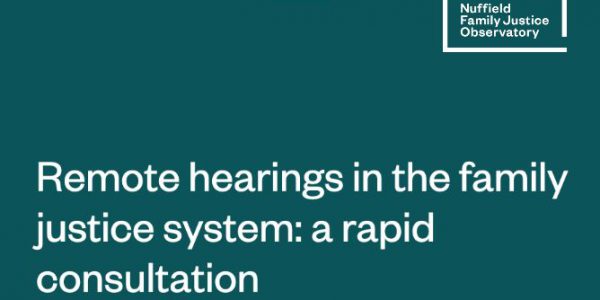Nearly two thirds of professionals responding to a new survey felt that more needs to be done to ensure that remote hearings – now commonplace in the family court because of COVID-19 – were fair and worked smoothly.
More than 3,200 professionals (lawyers, magistrates, judges, social workers and others in the family justice system), parents and other family members from across England and Wales have shared their experiences of the family court over the last year as part of a rapid consultation by Nuffield Family Justice Observatory to inform post-pandemic recovery planning by the President of the Family Division.
The majority of professionals saw a continuing role for certain types of remote hearing, though raised concerns that hearings were often remote ‘by default’ and that considerations such as the vulnerability of lay parties and their wishes and views, the complexity of the case, and whether there was access to suitable technology for all those taking part should be taken into account. There was support for remote ‘administrative’ hearings but much less for remote fact-finding hearings, hearings involving contested applications for interim care or contact orders, or final hearings. Some commented that remote hearings would always be inferior to hearings in person.
A majority of parents (73%) indicated that they did not feel supported during their hearing(s). Just under half (46%) did not have legal representation, and others raised concerns about not being able to be with their legal representative during the hearing and the difficulties communicating with them as a result. Two in five reported that they had wanted to attend court but had been prevented from doing so.
While many professionals reported that the technology to support remote hearings had improved over the last year, responses indicated a high proportion of hearings still taking place by telephone and ongoing issues with connectivity and access to appropriate hardware. One in three parents who responded to the consultation had joined a hearing by phone, even if the hearing was being held by video conference. There were continuing problems managing remote hearings where intermediaries or interpreters were required.
Suggestions to improve how remote hearings were run included making sure lay parties and their representatives were better prepared for the hearing, checking access to technology/links before the start of the hearing, providing better written guidance to parents and professionals and improving the technology. Many professionals suggested there should be more places where parents could go to be with their legal representative or other support to attend the hearing remotely, yet only four of the 174 parents who responded to the consultation indicated that they had been provided somewhere to attend the hearing.
There is a clear disconnect between the measures professionals can see would help remote hearings run more smoothly – particularly for parents and family members – and what is still happening in some family courts. Many of the suggestions for improvements are neither complicated nor new, so it is vital to understand why they are not being put into practice. Families must feel that they have had fair access to justice in what are some of the most life-changing cases heard in courts – and that must apply to remote hearings too.”
Lisa Harker, director of Nuffield Family Justice Observatory.










